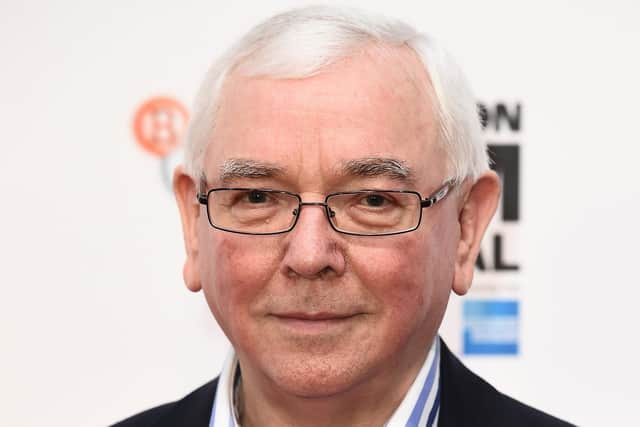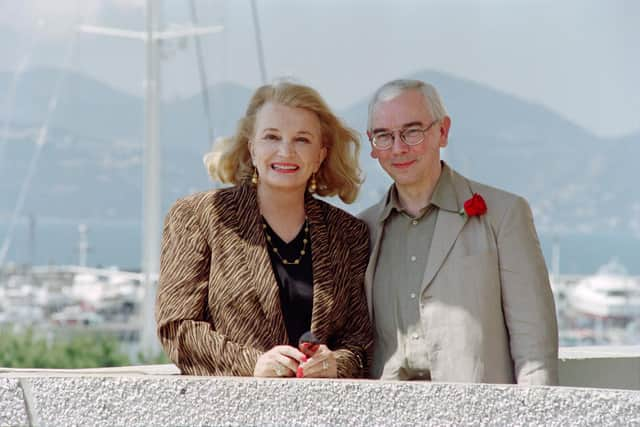Scotsman Obituaries: Terence Davies, acclaimed film director who shot two of his best-known productions in Scotland


Terence Davies was never a household name, but he was sufficiently esteemed in the film industry to persuade Gillian Anderson at the height of the X-Files phenomenon to make a low-budget arthouse movie in Glasgow when she could have been making millions in Hollywood.
Davies did not cast her because she was a big name – he must have been one of the few people in the western world who had never heard of The X-Files back in the 1990s. He saw a photo of her and thought she would be right for the lead in his period drama The House of Mirth. Ironically, she was one of Davies’s biggest fans.
Advertisement
Hide AdAdvertisement
Hide AdHe used Glasgow to double for New York City a century earlier in his 2000 adaptation of Edith Wharton’s novel about a socialite looking for a rich husband. It was a marked departure from Davies’s highly personal early work.


Davies had scored an arthouse hit in 1988 with Distant Voices, Still Lives, a semi-autobiographical movie about a working-class Liverpool family in the 1940s and 1950s. Although the family is presided over by a violent father, Davies managed to produce a film that was poetic and warm-hearted.
We met as he was starting shooting on The House of Mirth and he told me he had been looking for an actress who looked like a John Singer Sargent portrait when he happened upon a photo of Anderson. “I saw her extraordinary face and that kind of luminosity that one associated with Greer Garson in the late Forties.” Anderson was on holiday in London when her agent phoned to say an English director wanted to set up a meeting. Anderson was reluctant at first, reiterating that she was on holiday. “It’s with this obscure director,” her agent said. “You’ll never have heard of him. His name is Terence Davies.” “I was like, ‘Wah, I’ll take it,’” said Anderson.
After Distant Voices, Still Lives Davies seemed as much a part of Liverpool as the Beatles – though he was not a fan of the group, far too modern. He cried with happiness when he saw Singin’ in the Rain as a boy. Music played a major role in his films. In Distant Voices, Still Lives he presented a portrait of a family and a city with a soundtrack of songs from a time before the Beatles.
But it was to Scotland he returned in the mid-2010s for an adaptation of another literary classic, this time a Scottish one, Lewis Grassic Gibbon’s Sunset Song, with Peter Mullan in the role of another violent father, the model Agyness Deyn as his daughter, striving to assert her own identity, and Kevin Guthrie as her ill-fated husband.
In a career spanning four decades Davies made only ten feature films, and that includes an anthology of shorts and a 2008 documentary about Liverpool. It was entitled Of Time and the City and billed as “a love song and a eulogy”. BBC critic Mark Kermode rated the piece as the best film of the decade.
Davies was born in Liverpool, the youngest of ten children. His father was a rag-and-bone man – it is perhaps typical of Davies’s whimsical sense of humour that in the short film Death and Transfiguration the main character is played by Wilfrid Brambell, best known as the rag-and-bone man in BBC sitcom Steptoe and Son.
In Distant Voices, Still Lives, there is a scene where the father breaks a broom across his daughter’s back. Pete Postlethwaite, who played the father, wondered if it was not over the top. Davies suggested Postlethwaite phone his sister if he needed convincing that it actually happened.
Advertisement
Hide AdAdvertisement
Hide AdDavies’s abusive, alcoholic father died of cancer when he was seven, much to his son’s delight, though there was more abuse when he went to the Sacred Heart Roman Catholic boys’ secondary school. “The first day, these lads saw their victim,” he said. “I was beaten up every day for the next four years.” His Roman Catholic upbringing added to his struggle with his homosexuality.
He worked as a shipping clerk and bookkeeper for a decade before enrolling at drama school in Coventry and writing the first of three very personal shorts, a film entitled Children. It later became the first chapter in the Terence Davies Trilogy, which followed a single gay character from childhood to old age.
After making Children, Davies went back to working as a bookkeeper before getting into the National Film School. His graduation film, Madonna and Child, became the middle part of Trilogy, which took the best part of a decade to complete with Death and Transfiguration.
Distant Voices, Still Lives is generally treated as his debut feature, but was actually shot as two separate films two years apart. It proved a highly emotional experience for Davies, who at times would sit on Postlethwaite’s lap while his on-screen father offered some sort of comfort.
He went on to make The Long Day Closes, which again drew on his childhood in post-war Liverpool; The Neon Bible, which took him to America and starred Gena Rowlands; and then The House of Mirth. Davies admitted being “starstruck” by Rowlands, who he remembered seeing in Lonely Are The Brave when he was 11, but generally he was unimpressed by overt displays of “acting”. He said “Actors should feel, not act.”
Although his films were well received critically, they were not exactly blockbusters and he struggled for years to get the finance together for Sunset Song. His only other feature films were The Deep Blue Sea, an adaptation of a Terence Rattigan play, with Rachel Weisz; A Quiet Passion, with Cynthia Nixon as the poet Emily Dickinson; and most recently Benediction, with Jack Lowden and Peter Capaldi playing the war poet Siegfried Sassoon.
Davies lived alone and had no children. He was a gentle and quiet-spoken man, most of the time, though he did not suffer fools gladly. And he made no secret of the fact that there was an abundance of them in the film business. His films might readily be described as lyrical. They could be whimsical, nostalgic, sentimental, quietly amusing or simply despairing, perhaps like Davies himself.
Obituaries
If you would like to submit an obituary (800-1000 words preferred, with jpeg image), or have a suggestion for a subject, contact [email protected]